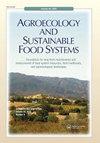农业生态学在苏格兰农民中的实践
IF 2.6
3区 农林科学
Q1 AGRICULTURE, MULTIDISCIPLINARY
引用次数: 0
摘要
转型农业生态学挑战工业化粮食和农业系统,提出了另一种愿景,即围绕生态共生设计农场,并将其嵌入社会公正的食物网络中。然而,在政策层面上,出现了强调农场效率提高但缺乏农业生态系统和粮食系统转型更广泛目标的生态农业概念。这个现象学调查探讨了苏格兰农民之间的农业生态叙事,并考虑其对农业生态系统和粮食系统变化的影响。根据跨位置认知方法(TPCA),在苏格兰的15个农场(20名参与者)进行了访谈。农业生态学的实现被认为是发展个性化、低投入农业系统的价值驱动方法。所有农场都试图通过应用生态原则来影响农业生态系统的变化,大多数农场(11/15)通过参与替代粮食网络直接促进粮食系统的变化。小规模农民似乎提供了最真实的转型农业生态学的实现,但更强烈地强调了他们的财务挑战。对政策制定者的一项重要建议是加强对小规模生态农业的支持机制。本文章由计算机程序翻译,如有差异,请以英文原文为准。
Actualizations of agroecology among Scottish farmers
Transformative agroecology challenges industrialized food and farming systems, proposing an alternative vision in which farms are designed around ecological symbioses and embedded within socially just food networks. However, at a policy level, alternative conceptualizations of agroecology have emerged that emphasize on-farm efficiency gains but lack broader objectives of agroecosystem and food system transformation. This phenomenological inquiry explores the agroecological narrative among Scottish farmers and considers its impacts on agroecosystem and food system change. Interviews were conducted across 15 farms in Scotland (20 participants) following the trans positional cognition approach (TPCA). Actualizations of agroecology were found to be value-driven approaches to developing individualized, lower-input farming systems. All farms were attempting to influence agroecosystem change through the application of ecological principles, and most (11/15) were contributing to food system change directly through involvement in alternative food networks. Smaller-scale farmers appear to deliver the most authentic actualizations of transformative agroecology but emphasized more strongly their financial challenges. A key recommendation for policymakers is to strengthen the support mechanisms available for small-scale ecological agriculture.
求助全文
通过发布文献求助,成功后即可免费获取论文全文。
去求助
来源期刊

Agroecology and Sustainable Food Systems
AGRICULTURE, MULTIDISCIPLINARY-GREEN & SUSTAINABLE SCIENCE & TECHNOLOGY
CiteScore
4.80
自引率
7.70%
发文量
73
期刊介绍:
Agroecology and Sustainable Food Systems is devoted to the rapidly emerging fields of agroecology and food system sustainability. By linking scientific inquiry and productive practice with transformative social action, agroecology provides a foundation for developing the alternative food systems of the future. The journal focuses on the changes that need to occur in the design and management of our food systems in order to balance natural resource use and environmental protection with the needs of production, economic viability, food security, and the social well-being of all people.
Agroecology and Sustainable Food Systems examines our current food systems from production to consumption, and the urgent need to transition to long-term sustainability. The journal promotes the study and application of agroecology for developing alternatives to the complex problems of resource depletion, environmental degradation, a narrowing of agrobiodiversity, continued world hunger, consolidation and industrialization of the food system, climate change, and the loss of farm land. The journal uses a food systems approach, and seeks experiences in agroecology that are on-farm, participatory, change-oriented, and backed by broad-based methodologies of sustainability analysis and evaluation.
 求助内容:
求助内容: 应助结果提醒方式:
应助结果提醒方式:


